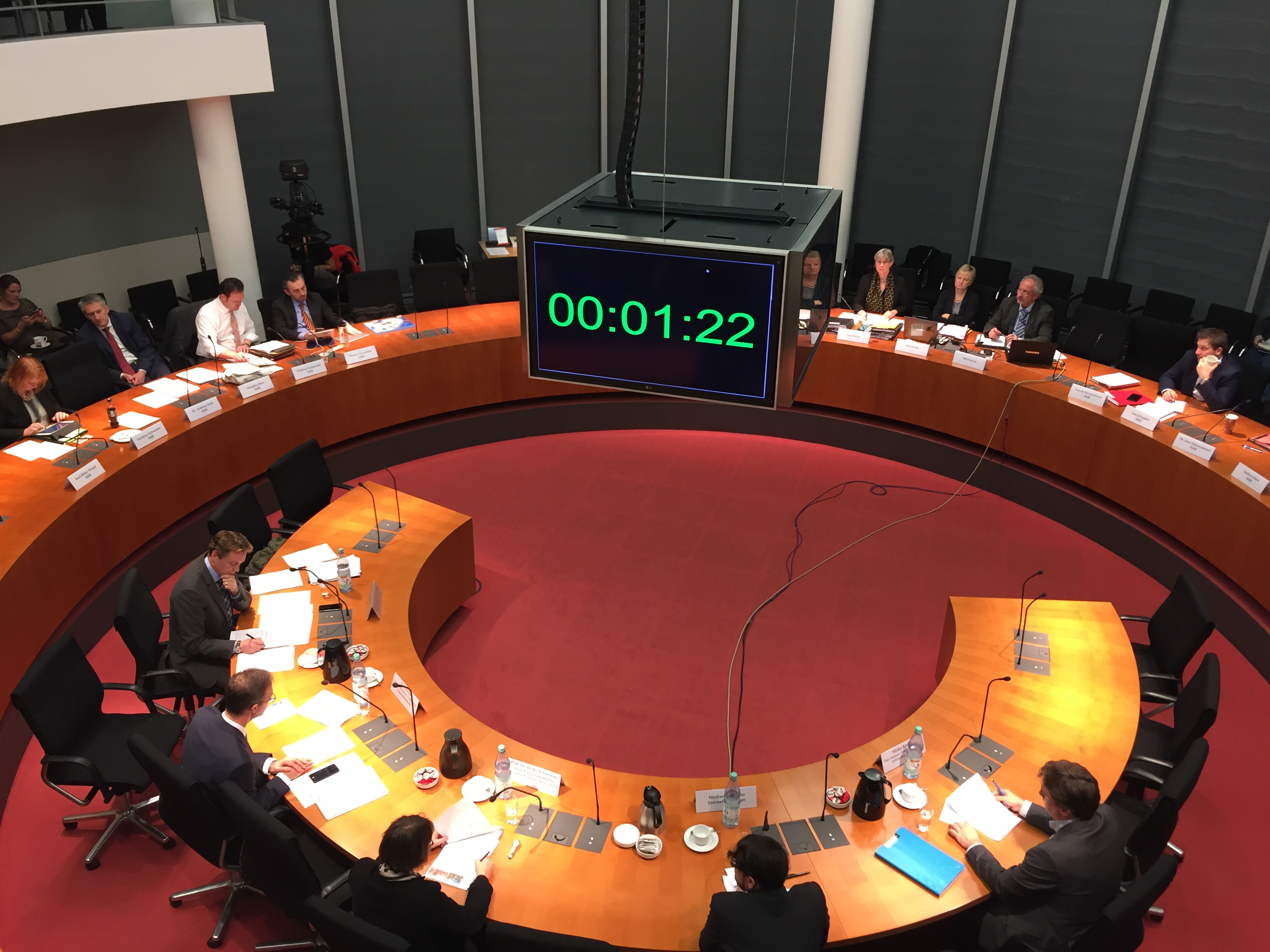The Committee on the Digital Agenda of the German Bundestag held a public hearing this week on the topic "Platforms: Interoperability and Neutrality." Clark Parsons, the Managing Director of the Internet Economy Foundation, was among the invited speakers.
Further documents and statements

Opening Statement from Clark Parsons
Digital Platforms are currently the biggest success stories of the Internet Age. Without them, nothing runs anymore, neither in the Internet nor the Old Economy. In Germany we like to tell ourselves that we can catch up digitally via the Industry 4.0 initiative. This self-comfort is misplaced, because the real power in the digital economy lies with platforms.
Six of the ten most valuable companies in the world operate such platforms. Five of them are from the USA; one is from China. Europe comprises only 5% of the worldwide market valuation of online platforms, whereas 50% of that value lies in Silicon Valley. Asian operators are growing rapidly too. Right now, Europe is misplaying its chance.
So that there is no misunderstadning: platforms are good and important. We need them. Their success is based on their value – consumers profit from them, especially. We want European companies to be able to find their place among the global players.
However, in light of the ongoing success of some platforms, a debate is raging about their market position and the adjustment of competition rules. That’s because the platform economy has a tendency to form monopolies. The bigger the network, more exclusive the knowledge about customers, the wider the offering, the more attractive the platform becomes, and with that smaller competitors are forced out, until finally only one remains: the winner takes it all....
In this way, leading platforms, primarily from the USA, now occupy such a dominant market position that in some cases it is endangering fair and free competition.
This is not about drawing a battle line between Europe and America. Indeed, criticial voices are coming out of the USA as well. US Senator Elizabeth Warren recently said: „Google, Apple, and Amazon deserve to be highly profitable and successful. But the opportunity to compete must remain open for new entrants and smaller competitors that want their chance to change the world again.”
So what is to be done?
We have to find ways to maintain, or re-establish, a level-playing field in this market, so that all aspiring platforms can have their chance. Recently the IE.F published a study with the consultancy Roland Berger: "Fair Play in the Digital Arena". In our view the following action areas are central:
1) Unified Regulation
The legal framework needs to be aligned and unified Europe-wide, and changed to fit the demands of competitive structures. Platforms call for a transnational regulatory framework. Where this doesn’t exist, individual countries have to fill that gap by consequentially enforcing the familiar European legal principle of the place of delivery.
2) Prevention of Market Closure
Platforms can be differentiated by factors such as market power and system relevance. The main questions for that are: are the platforms taking on the character of an infrastructure, upon which others have to build? Are they therefore becoming „competitive bottlenecks?“ Do they control the access to customers and their data?
First of all, the existing competition rules need to be consequentially enforced. In especially sensitive areas, however, the regulations need to be adjusted. This includes platforms that operate a digital infrastructure that makes them system relevant – such as platforms that bundle diverse Internet services into a closed system. Monopoly positions here are especially dangerous, as they give the platform operators the possibility to hinder or even completely block consumers' access to competitors.
3) New cartel rights testing process
Regulation alone is not enough, while the timing is often wrong. Ex-ante-Regulation makes the rise of competitive new market entrants more difficult, or even prevents it altogether. Likewise, ex-post regulation often takes effect too late to reverse completed facts such as the establishment of market dominance.
We should strive for a cartel rights testing process which is triggered as soon as specific criteria are fulfilled, for example: reach, user penetration, and technology-induced or data-induced lock-in effects. These criteria should be tailor-made to fit the conditions of the digital economy. The proposed amendments to the German Act Against Restraints of Competition (GWB) are a step in the right direction, but need to be broadenend in scope, for instance to the question of access to data pools, or rules in mergers that include transaction value or purchase price.
4) Interoperability and Standardization
The platform economy needs to be more open, also in its technical design.
Interoperability and neutrality of platforms toward other services in the value chain are necessary conditions, because the market can only be opened and expanded when data can be transferred between platforms. That’s the only way that real competition can happen. The establishment of open interfaces (APIs) is not enough. There have to be shared standards.
There will be ever more powerful companies on the market that establish standards. The reason is the high dynamism of the digital economy, which is always a step ahead of the norming and stardards authorities. That’s why it is so important that other market participants can operate atop these de-facto market standards.
Also for other sectors such as production and trade, without interoperability and neutrality there is a strong danger of being dominated by platforms. That would knock our „industrial heart“ massively out of its rhythm and could cause economic and social distortions.
I’d like to thank the comittee for the possibility to speak here today. We wish you, honored Ladies and Gentlemen Members of the German Parliament, much success in helping to raise awareness in the Bundestag and Federal Government for how decisive the subject of platforms is for our economic and social future!